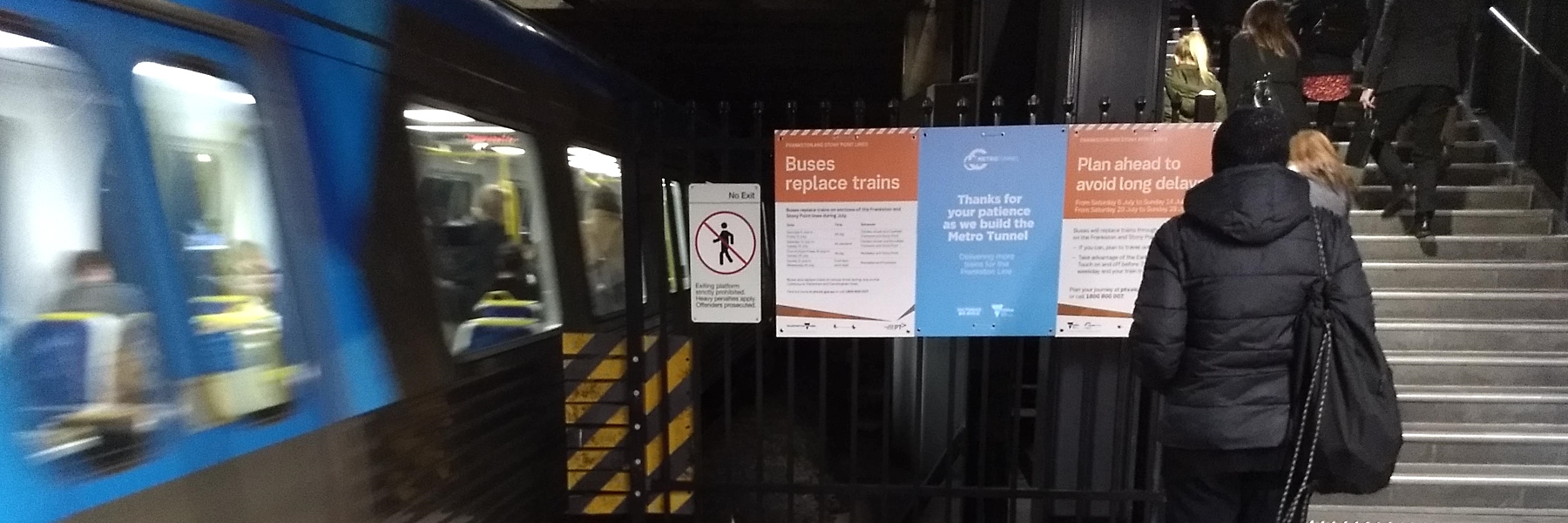I’ve been listening to the Transit Unplugged podcast for a while now on my (sometimes quite long) weekend walks.
They typically interview CEOs and other senior managers from public transport systems in the USA, often small-to-medium sized operations.
In recent weeks they’ve published a set of interviews with CEOs from much larger operations – and the reason this is of particular interest to locals here is that they’re all in Australia – mostly Melbourne.
Featuring are PTV (since merged into Department of Transport), Metro, Yarra Trams and V/Line, along with Transport Canberra, Sydney Trains/NSW Trainlink and John Holland.
While I know and have spoken to some of the people involved, it’s interesting to hear about issues from this perspective – interviewed by host Paul Comfort, who is a former CEO of an American public transport operator.
They’re not challenging interviews – but some of the challenges facing these operations certainly get highlighted.
The interviews are also a reminder that behind the scenes of the public transport operations that we passengers see day to day, there’s a lot of management of people and finance that’s also going on – something in common with any big organisation.
The other theme is that of change. For instance the PTV interview notes that one seat journeys are no longer realistic for all trips in a city the size of Melbourne, but work needs to be done on better interchanges. The V/Line interview notes the transition from a regional rail operator to (at least for many passengers) a commuter railway.
I can see a few typos in the transcripts – especially for Jeroen Weimar, who is a fast talker when he gets going – and Nicolas Gindt’s reference to gunzels, in his French accent, which must have confounded the host, is missing.
Perhaps the transcripts were generated by a computer – and you might also note a few minor gaffes in the recordings, but still, these are very interesting and well worth a listen.
I’ll leave you with this great optimistic quote from Howard Collins from Sydney Trains:
Australia has hit the golden age of rail. I think for the first time in probably 50 years, Australians realize public transport is the only way to get cities to work. Expanding cities like Melbourne and Sydney, which are going to grow from five million to eight million in the next 20 years, you can’t drive, you can’t have that culture of car anymore. You’ve got to look at London and New York, and you’ll see that public transport.
Update: There’s also a live podcast from a discussion at the recent UITP conference, featuring Ian Dobbs (1990s era The Met/PTC, and also 2000s era PTV, now with UITP Australia), Allan Fedda (PTV deputy CEO) and Nicolas Gindt (Yarra Trams CEO) as well as Nat Ford (Jacksonville, Florida).
All the podcasts are here: Transit Unplugged Podcasts
- PTUA members and would-be members: the next member meeting on 25th July features Councillor Nic Frances Gilley from City of Melbourne, talking about their draft transport strategy. Details here.

4 replies on “Transit Unplugged”
That quote from Sydney Trains sounds good. If Australians have realised it, that’s great, but the question is, have politicians realised it? They’re the ones that provide the funding after all.
I certainly hope that Howard Collins’ optimism bears out. Certainly, this is the first time in my life (and I’m almost 40) that I can recall this much construction going on in Melbourne. As well as projects like the Gold Coast Light Rail elsewhere, that would have been unthinkable in the 80s and 90s.
We’ve still had pretty stridently anti-commuter rail politicians such as Tony Abbott in recent years, not to mention a Victorian Liberal party that are still fixated on E-W link and that half-baked mass road separation plan at the last election (which I really hope is dead and buried).
I’ll believe it’s really true when there is clear bipartisan support for rail from both majors.
Rail is definitely the way to go but there are huge network issues to be addressed in VIC. This is incredibly expensive and requires lots more funding than what we have right now.
E-W SHOULD BE BUILT AS WELL. This is a transport network issue, improvements are marginal from few big rail projects.
“E-W SHOULD BE BUILT AS WELL.” – Why?
It’s an economic basketcase, and Melbourne already has more motorways than comparable cities.